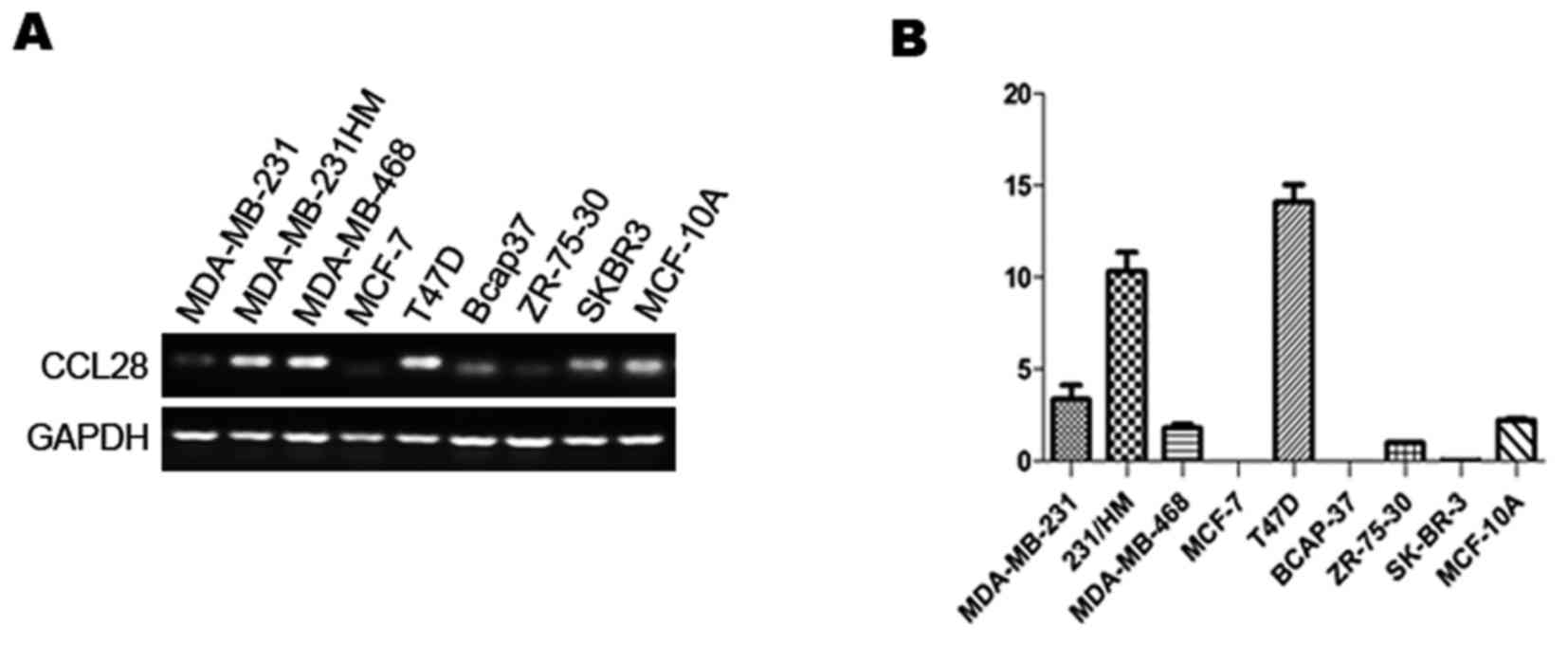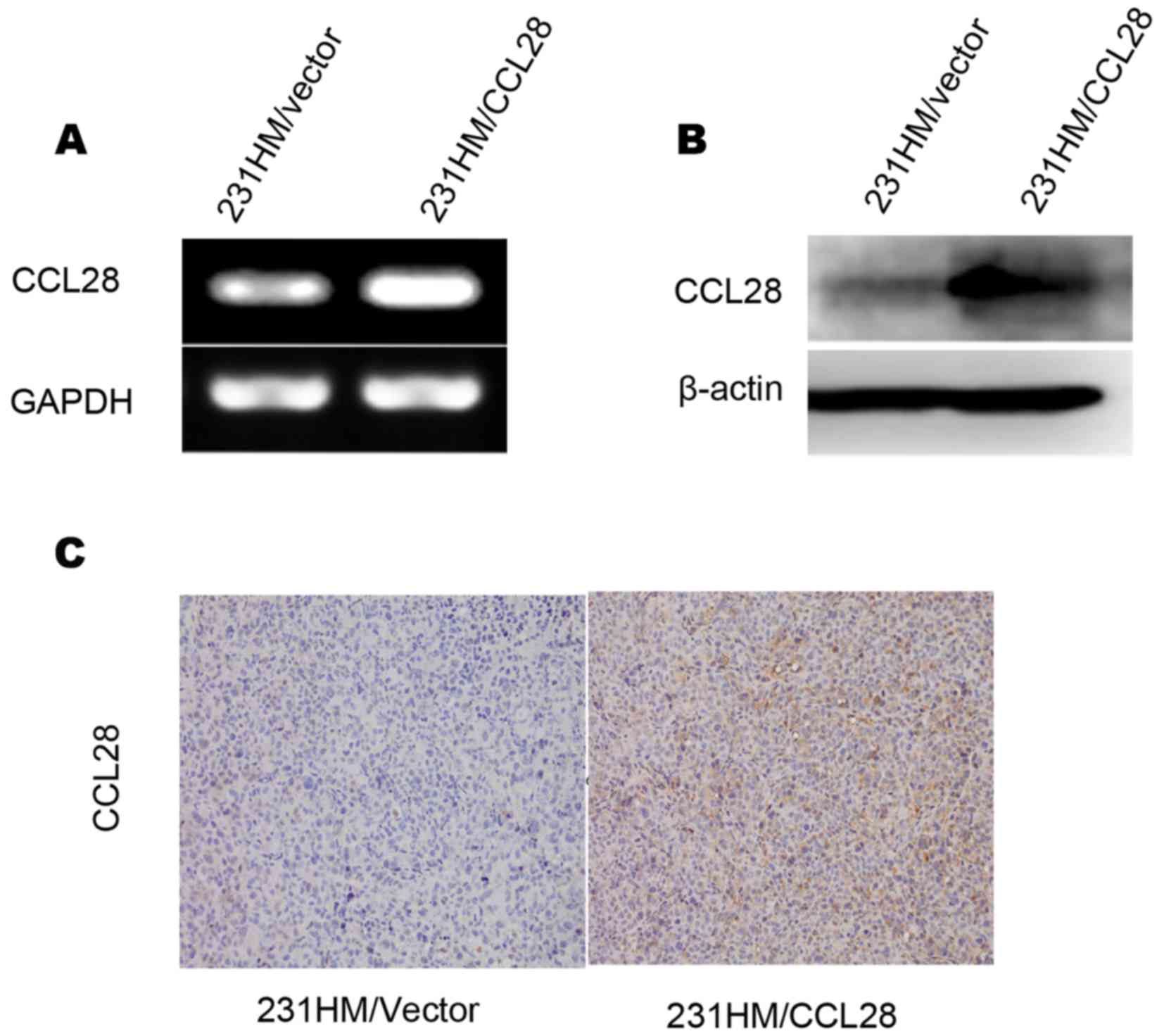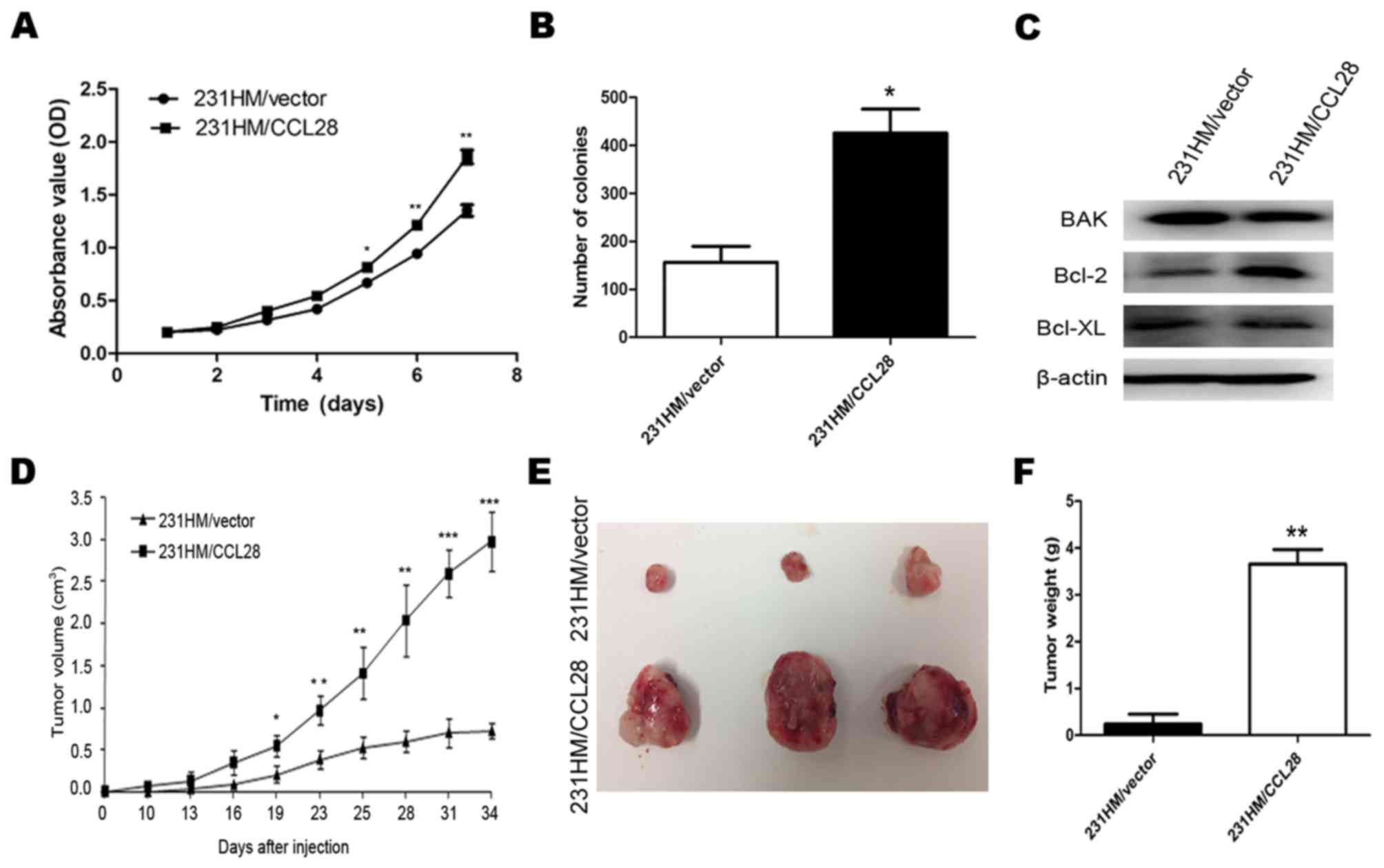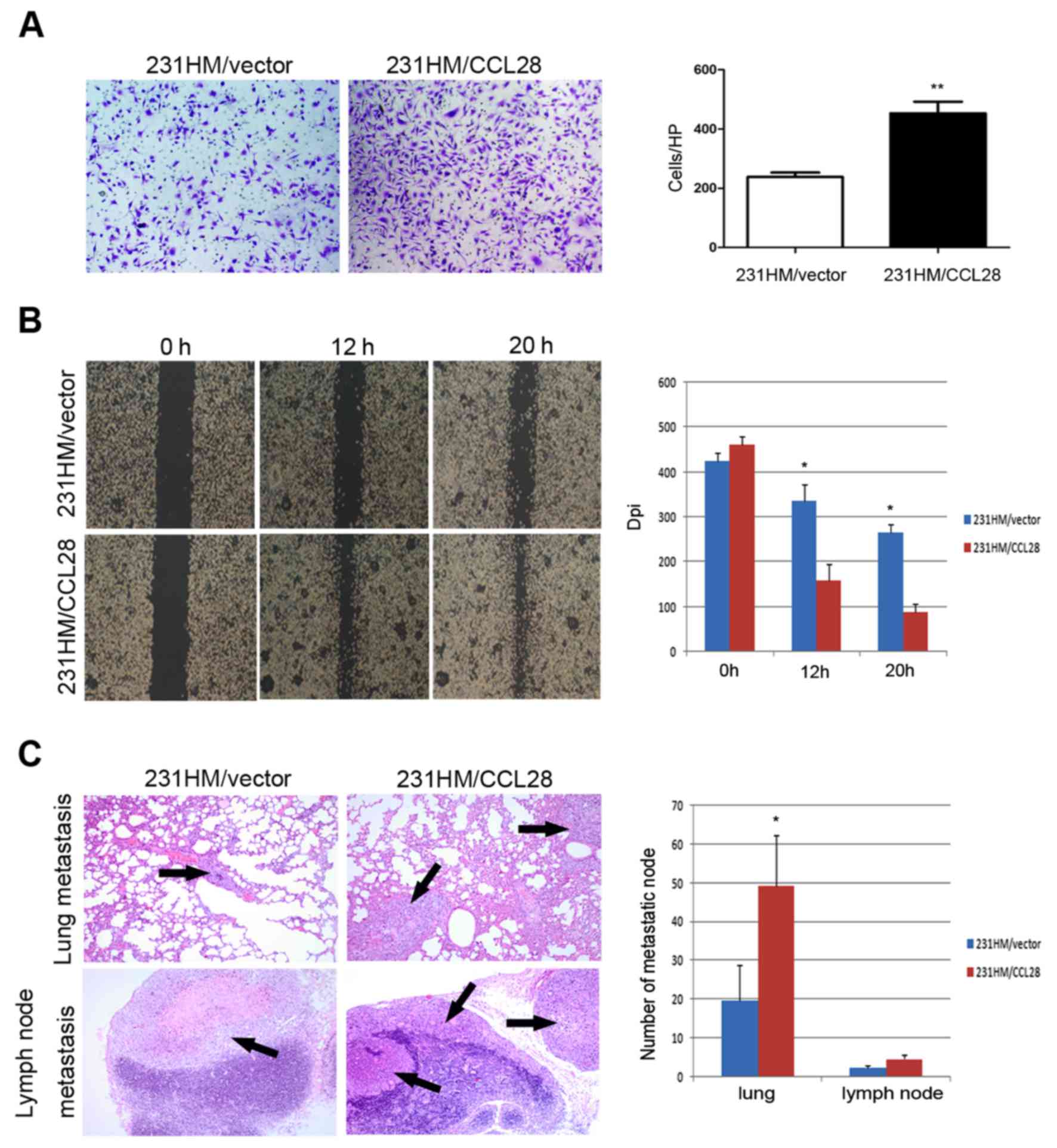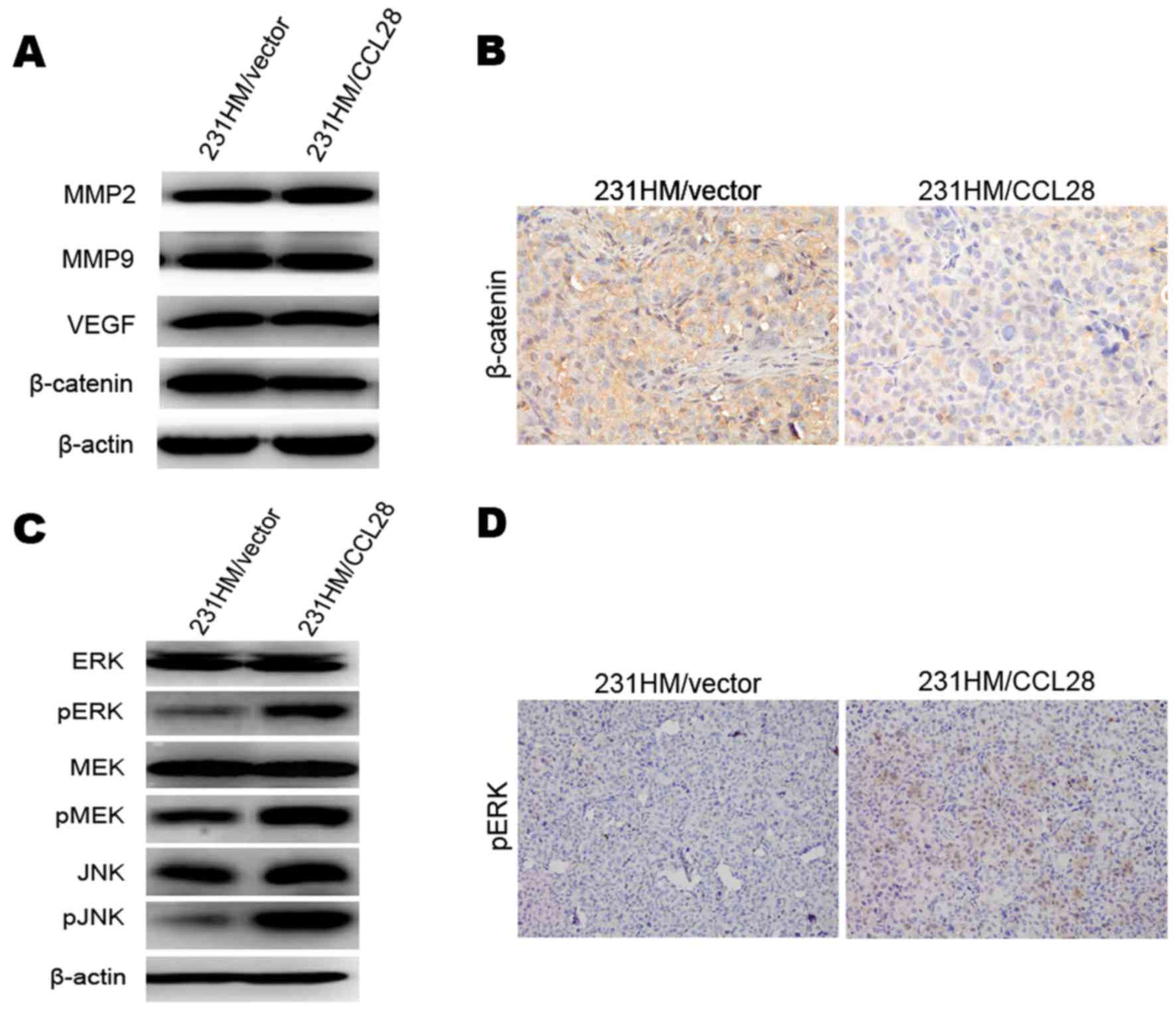|
1
|
Chaffer CL and Weinberg RA: A perspective
on cancer cell metastasis. Science. 331:1559–1564. 2011. View Article : Google Scholar : PubMed/NCBI
|
|
2
|
Siegel R, Naishadham D and Jemal A: Cancer
statistics, 2012. CA Cancer J Clin. 62:10–29. 2012. View Article : Google Scholar : PubMed/NCBI
|
|
3
|
Mantovani A, Savino B, Locati M, Zammataro
L, Allavena P and Bonecchi R: The chemokine system in cancer
biology and therapy. Cytokine Growth Factor Rev. 21:27–39. 2010.
View Article : Google Scholar : PubMed/NCBI
|
|
4
|
Chen J, Yao Y, Gong C, Yu F, Su S, Chen J,
Liu B, Deng H, Wang F, Lin L, et al: CCL18 from tumor-associated
macrophages promotes breast cancer metastasis via PITPNM3. Cancer
Cell. 19:541–555. 2011. View Article : Google Scholar : PubMed/NCBI
|
|
5
|
Ploenes T, Scholtes B, Krohn A, Burger M,
Passlick B, Müller-Quernheim J and Zissel G: CC-chemokine ligand 18
induces epithelial to mesenchymal transition in lung cancer A549
cells and elevates the invasive potential. PLoS One. 8:e530682013.
View Article : Google Scholar : PubMed/NCBI
|
|
6
|
Qian BZ, Li J, Zhang H, Kitamura T, Zhang
J, Campion LR, Kaiser EA, Snyder LA and Pollard JW: CCL2 recruits
inflammatory monocytes to facilitate breast-tumour metastasis.
Nature. 475:222–225. 2011. View Article : Google Scholar : PubMed/NCBI
|
|
7
|
Tsuyada A, Chow A, Wu J, Somlo G, Chu P,
Loera S, Luu T, Li AX, Wu X, Ye W, et al: CCL2 mediates cross-talk
between cancer cells and stromal fibroblasts that regulates breast
cancer stem cells. Cancer Res. 72:2768–2779. 2012. View Article : Google Scholar : PubMed/NCBI
|
|
8
|
Fang WB, Jokar I, Zou A, Lambert D,
Dendukuri P and Cheng N: CCL2/CCR2 chemokine signaling coordinates
survival and motility of breast cancer cells through Smad3 protein-
and p42/44 mitogen-activated protein kinase (MAPK)-dependent
mechanisms. J Biol Chem. 287:36593–36608. 2012. View Article : Google Scholar : PubMed/NCBI
|
|
9
|
Wang W, Soto H, Oldham ER, Buchanan ME,
Homey B, Catron D, Jenkins N, Copeland NG, Gilbert DJ, Nguyen N, et
al: Identification of a novel chemokine (CCL28), which binds CCR10
(GPR2). J Biol Chem. 275:22313–22323. 2000. View Article : Google Scholar : PubMed/NCBI
|
|
10
|
Pan J, Kunkel EJ, Gosslar U, Lazarus N,
Langdon P, Broadwell K, Vierra MA, Genovese MC, Butcher EC and
Soler D: A novel chemokine ligand for CCR10 and CCR3 expressed by
epithelial cells in mucosal tissues. J Immunol. 165:2943–2949.
2000. View Article : Google Scholar : PubMed/NCBI
|
|
11
|
Shibata S, Maeda S, Maeda S, Chimura N,
Kondo N and Fukata T: Augmentation of CCL17 and CCL28 gene
expression by TNF-alpha, IL-1beta, or IFN-gamma in cultured canine
keratinocytes. Res Vet Sci. 88:422–426. 2010. View Article : Google Scholar : PubMed/NCBI
|
|
12
|
Ogawa H, Iimura M, Eckmann L and Kagnoff
MF: Regulated production of the chemokine CCL28 in human colon
epithelium. Am J Physiol Gastrointest Liver Physiol.
287:G1062–G1069. 2004. View Article : Google Scholar : PubMed/NCBI
|
|
13
|
Dimberg J, Hugander A and Wågsäter D:
Protein expression of the chemokine, CCL28, in human colorectal
cancer. Int J Oncol. 28:315–319. 2006.PubMed/NCBI
|
|
14
|
Liu GX, Lan J, Sun Y, Hu YJ and Jiang GS:
Expression of the chemokine CCL28 in pleomorphic adenoma and
adenolymphoma of the human salivary glands. Exp Ther Med. 4:65–69.
2012.PubMed/NCBI
|
|
15
|
Facciabene A, Peng X, Hagemann IS, Balint
K, Barchetti A, Wang LP, Gimotty PA, Gilks CB, Lal P, Zhang L, et
al: Tumour hypoxia promotes tolerance and angiogenesis via CCL28
and T(reg) cells. Nature. 475:226–230. 2011. View Article : Google Scholar : PubMed/NCBI
|
|
16
|
Mickanin CS, Bhatia U and Labow M:
Identification of a novel β-chemokine, MEC, down-regulated in
primary breast tumors. Int J Oncol. 18:939–944. 2001.PubMed/NCBI
|
|
17
|
Li JY, Ou ZL, Yu SJ, Gu XL, Yang C, Chen
AX, Di GH, Shen ZZ and Shao ZM: The chemokine receptor CCR4
promotes tumor growth and lung metastasis in breast cancer. Breast
Cancer Res Treat. 131:837–848. 2012. View Article : Google Scholar : PubMed/NCBI
|
|
18
|
Yang G, Rosen DG, Liu G, Yang F, Guo X,
Xiao X, Xue F, Mercado-Uribe I, Huang J, Lin SH, et al: CXCR2
promotes ovarian cancer growth through dysregulated cell cycle,
diminished apoptosis, and enhanced angiogenesis. Clin Cancer Res.
16:3875–3886. 2010. View Article : Google Scholar : PubMed/NCBI
|
|
19
|
Yang G, Rosen DG, Mercado-Uribe I,
Colacino JA, Mills GB, Bast RC Jr, Zhou C and Liu J: Knockdown of
p53 combined with expression of the catalytic subunit of telomerase
is sufficient to immortalize primary human ovarian surface
epithelial cells. Carcinogenesis. 28:174–182. 2007. View Article : Google Scholar : PubMed/NCBI
|
|
20
|
Jones LW, Viglianti BL, Tashjian JA,
Kothadia SM, Keir ST, Freedland SJ, Potter MQ, Moon EJ, Schroeder
T, Herndon JE II, et al: Effect of aerobic exercise on tumor
physiology in an animal model of human breast cancer. J Appl
Physiol (1985). 108:343–348. 2010. View Article : Google Scholar : PubMed/NCBI
|
|
21
|
Aaltomaa S, Kärjä V, Lipponen P, Isotalo
T, Kankkunen JP, Talja M and Mokka R: Reduced alpha- and
beta-catenin expression predicts shortened survival in local
prostate cancer. Anticancer Res. 25:4707–4712. 2005.PubMed/NCBI
|
|
22
|
Wang J, Ou ZL, Hou YF, Luo JM, Shen ZZ,
Ding J and Shao ZM: Enhanced expression of Duffy antigen receptor
for chemokines by breast cancer cells attenuates growth and
metastasis potential. Oncogene. 25:7201–7211. 2006. View Article : Google Scholar : PubMed/NCBI
|
|
23
|
Wu FY, Ou ZL, Feng LY, Luo JM, Wang LP,
Shen ZZ and Shao ZM: Chemokine decoy receptor d6 plays a negative
role in human breast cancer. Mol Cancer Res. 6:1276–1288. 2008.
View Article : Google Scholar : PubMed/NCBI
|
|
24
|
Feng LY, Ou ZL, Wu FY, Shen ZZ and Shao
ZM: Involvement of a novel chemokine decoy receptor CCX-CKR in
breast cancer growth, metastasis and patient survival. Clin Cancer
Res. 15:2962–2970. 2009. View Article : Google Scholar : PubMed/NCBI
|
|
25
|
Eksteen B, Miles A, Curbishley SM,
Tselepis C, Grant AJ, Walker LS and Adams DH: Epithelial
inflammation is associated with CCL28 production and the
recruitment of regulatory T cells expressing CCR10. J Immunol.
177:593–603. 2006. View Article : Google Scholar : PubMed/NCBI
|
|
26
|
Hieshima K, Ohtani H, Shibano M, Izawa D,
Nakayama T, Kawasaki Y, Shiba F, Shiota M, Katou F, Saito T, et al:
CCL28 has dual roles in mucosal immunity as a chemokine with
broad-spectrum antimicrobial activity. J Immunol. 170:1452–1461.
2003. View Article : Google Scholar : PubMed/NCBI
|
|
27
|
Jiang P, Lan J, Hu Y, Li D and Jiang G:
Enhancing CCL28 expression through the gene transfer to salivary
glands for controlling cariogenic microbe. Cytokine. 59:94–99.
2012. View Article : Google Scholar : PubMed/NCBI
|
|
28
|
Mattern J and Volm M: Imbalance of cell
proliferation and apoptosis during progression of lung carcinomas.
Anticancer Res. 24:4243–4246. 2004.PubMed/NCBI
|
|
29
|
Kordezangeneh M, Irani S, Mirfakhraie R,
Esfandyari-Manesh M, Atyabi F and Dinarvand R: Regulation of
BAX/BCL2 gene expression in breast cancer cells by docetaxel-loaded
human serum albumin nanoparticles. Med Oncol. 32:2082015.
View Article : Google Scholar : PubMed/NCBI
|
|
30
|
Eom YH, Kim HS, Lee A, Song BJ and Chae
BJ: BCL2 as a subtype-specific prognostic marker for breast cancer.
J Breast Cancer. 19:252–260. 2016. View Article : Google Scholar : PubMed/NCBI
|
|
31
|
Chen J, Hou R, Zhang X, Ye Y, Wang Y and
Tian J: Calycosin suppresses breast cancer cell growth via
ERβ-dependent regulation of IGF-1R, p38 MAPK and PI3K/Akt pathways.
PLoS One. 9:e912452014. View Article : Google Scholar : PubMed/NCBI
|
|
32
|
Yang XL, Lin FJ, Guo YJ, Shao ZM and Ou
ZL: Gemcitabine resistance in breast cancer cells regulated by
PI3K/AKT-mediated cellular proliferation exerts negative feedback
via the MEK/MAPK and mTOR pathways. Onco Targets Ther. 7:1033–1042.
2014.PubMed/NCBI
|
|
33
|
Takeda A, Baffi JZ, Kleinman ME, Cho WG,
Nozaki M, Yamada K, Kaneko H, Albuquerque RJ, Dridi S, Saito K, et
al: CCR3 is a target for age-related macular degeneration diagnosis
and therapy. Nature. 460:225–230. 2009. View Article : Google Scholar : PubMed/NCBI
|
|
34
|
Hanamoto H, Nakayama T, Miyazato H,
Takegawa S, Hieshima K, Tatsumi Y, Kanamaru A and Yoshie O:
Expression of CCL28 by Reed-Sternberg cells defines a major subtype
of classical Hodgkin's disease with frequent infiltration of
eosinophils and/or plasma cells. Am J Pathol. 164:997–1006. 2004.
View Article : Google Scholar : PubMed/NCBI
|
|
35
|
Wilson E and Butcher EC: CCL28 controls
immunoglobulin (Ig)A plasma cell accumulation in the lactating
mammary gland and IgA antibody transfer to the neonate. J Exp Med.
200:805–809. 2004. View Article : Google Scholar : PubMed/NCBI
|
|
36
|
Miyagaki T, Sugaya M, Murakami T, Asano Y,
Tada Y, Kadono T, Okochi H, Tamaki K and Sato S: CCL11-CCR3
interactions promote survival of anaplastic large cell lymphoma
cells via ERK1/2 activation. Cancer Res. 71:2056–2065. 2011.
View Article : Google Scholar : PubMed/NCBI
|
|
37
|
Kakinuma T and Hwang ST: Chemokines,
chemokine receptors, and cancer metastasis. J Leukoc Biol.
79:639–651. 2006. View Article : Google Scholar : PubMed/NCBI
|
|
38
|
Murakami T, Cardones AR, Finkelstein SE,
Restifo NP, Klaunberg BA, Nestle FO, Castillo SS, Dennis PA and
Hwang ST: Immune evasion by murine melanoma mediated through CC
chemokine receptor-10. J Exp Med. 198:1337–1347. 2003. View Article : Google Scholar : PubMed/NCBI
|
|
39
|
O'Gorman MT, Jatoi NA, Lane SJ and Mahon
BP: IL-1beta and TNF-alpha induce increased expression of CCL28 by
airway epithelial cells via an NFkappaB-dependent pathway. Cell
Immunol. 238:87–96. 2005. View Article : Google Scholar : PubMed/NCBI
|
|
40
|
Kagami S, Saeki H, Komine M, Kakinuma T,
Nakamura K, Tsunemi Y, Sasaki K, Asahina A and Tamaki K: CCL28
production in HaCaT cells was mediated by different signal pathways
from CCL27. Exp Dermatol. 15:95–100. 2006. View Article : Google Scholar : PubMed/NCBI
|
|
41
|
Karlsson C, Baudet A, Miharada N, Soneji
S, Gupta R, Magnusson M, Enver T, Karlsson G and Larsson J:
Identification of the chemokine CCL28 as a growth and survival
factor for human hematopoietic stem and progenitor cells. Blood.
121:3838–3842. 2013. View Article : Google Scholar : PubMed/NCBI
|
|
42
|
Sun C, Zhang YY, Tang CL, Wang SC, Piao
HL, Tao Y, Zhu R, Du MR and Li DJ: Chemokine CCL28 induces
apoptosis of decidual stromal cells via binding CCR3/CCR10 in human
spontaneous abortion. Mol Hum Reprod. 19:676–686. 2013. View Article : Google Scholar : PubMed/NCBI
|















